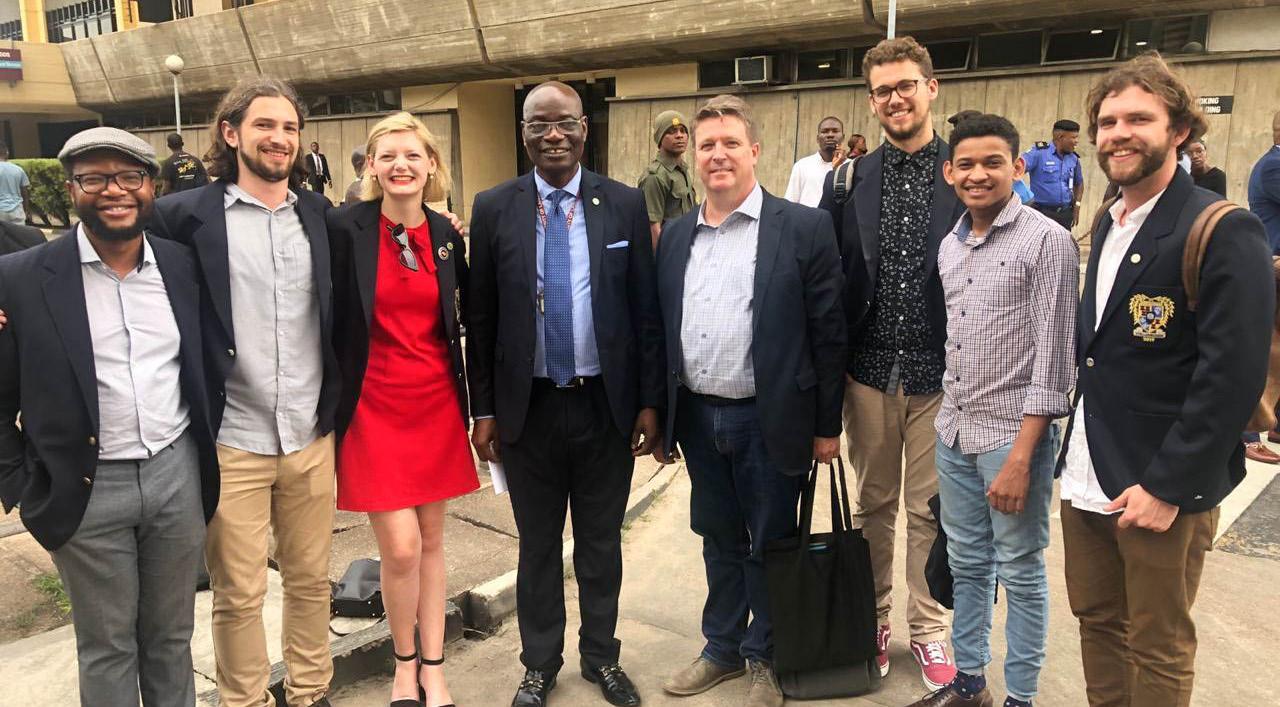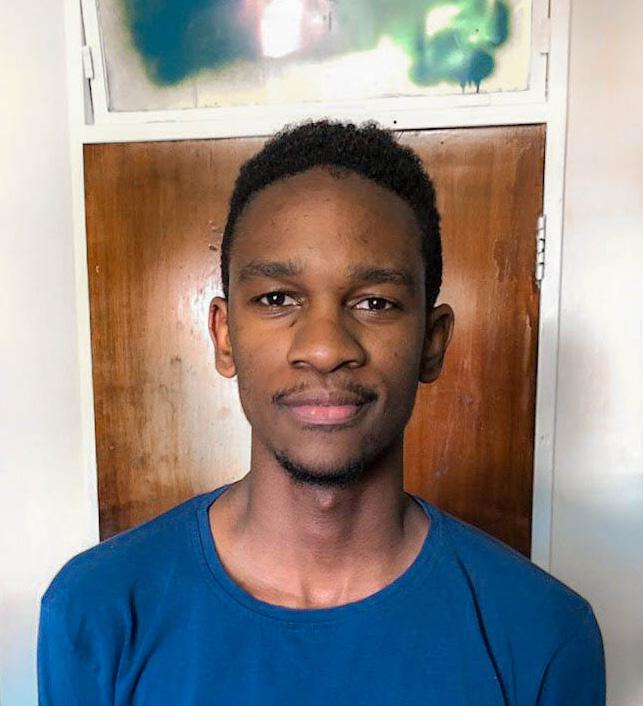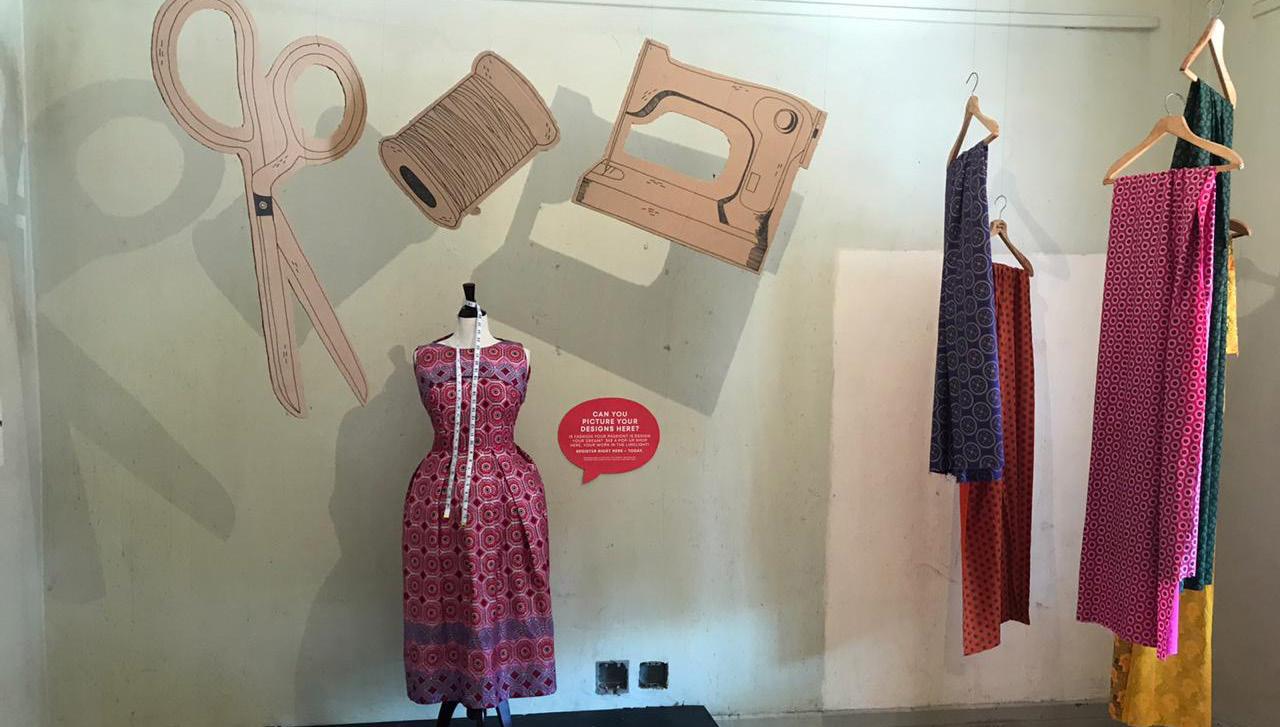
15 minute read
Students behind prison bars
SEBASTIAN UYS F ive members of the 2018/2019 Students Representative Council (SRC) of Stellenbosch University (SU), alongside official university staff, visited the University of Lagos from 14 to 18 October.
The University of Lagos hosted its first International Week which was themed, “Education in a Connected World”. The week’s focus was academic but also sought to address the requirements of effectively educating students in the 21st century.
Advertisement
The SRC engaged with the governor of Lagos, met the Deputy Speaker of the Nigerian State Assembly and connected with students from local schools.
Carli van Wyk, 2018/2019 SRC Chairperson, said, “Visiting Lagos has been an eye-opening experience.”
“After the xenophobic attacks in SA, I was unsure of how we will be received in Nigeria. Against all odds, the University of Lagos, the King of Lagos, statesmen and locals have received us with open hearts and invited us to visit again,” Van Wyk said.
Following the September xenophobic attacks in South Africa, of which many were directed at Nigerian-owned businesses, SU was the only South African university to attend the event.
“South Africa and Nigeria need to take their roles as leaders of the African continent seriously and place reconciliation and the needs of the African continent first, in order for all African people
LEADERS IN NIGERIA The 2018/2019 SRC with the vice-chancellor of University of Lagos, Professor Toyin Ogundipe, and Dr Nico Elema, Manager of the Centre for Collaboration in Africa at SU. Photo: Supplied
to prosper and move forward,” Van Wyk added.
Alex van Greuning, vice-chairperson of the 2018/2019 SRC said that “visiting Nigeria has reminded me of the resilience of the African spirit”.
“The amount of goodwill here towards South Africans despite the xenophobic attacks in Johannesburg and Pretoria has been truly humbling. The commitment to relationship and unity in Nigeria has convicted me as a South African to pursue those values to the same extent,” Van Greuning said.
A three day state visit between the Presidencies of Nigeria and South Africa was also held at the beginning of October. President Cyril Ramaphosa took to Twitter to emphasise Nigeria and South Africa’s role as driving forces in the integration of African nations and President Muhammad U Buhari of Nigeria declared that, “As the two largest economies in Africa, there are many areas in which Nigeria and South Africa can share experiences, invest and cooperate. Ours is a relationship full of potential and promise and this can only be a win-win for our peoples and for Africa at large.”
According to Paulu Joubert, the 2018/2019 Prim Committee Chairperson, the future relationship between these two nations will have to be one that is founded upon respect.
“There are a lot of similarities between South Africa and Nigeria and engaging with the student leadership here has shown me the unity within the struggles that we as African nations face,” Joubert said.
Joubert added the visit showed him that “African nations can only flourish if we work together”.
“Only if we stand together as Africa can we undo the injustices of the past and and set our own standards,” Joubert said.
Green light for cannabis farm
CHRISTOPHER JOUBERT
STELLENBOSCH - b a s e d strawberry farm, Polkadraai, has become the first to legally grow marijuana in the Western Cape. The cannabis company, Felbridge, was issued a licence by the South African Health Products Regulatory Authority following a two-year application process that began in October 2017. The success of the application required a thorough police clearance, information on the company, Felbridge, and an established deal with foreign buyers for the produce.
Felbridge is predominantly owned by the Zetler family, also owners of Polkadraai. According to the company’s website, “Felbridge is committed to improving society via the proven medical benefits of cannabis in our everyday lives”.
The cost of an approved marijuana farm has been estimated to be between 3 and 5 million rand. Recent policies regarding marijuana, such as the removal of Cannabidiol (CBD) from the list of highly controlled drugs and the decriminalisation of the personal use of marijuana by the Constitutional Court have changed the face of the dagga industry in South Africa during the last few years.
In an interview with CapeTalk, Leslie Zetler discussed some of the aspects of the licence process and approval. The investment to diversify the strawberry farm has been costly and the family has invested “quite a bit” Zetler said.
The licence permits Felbridge to use 14 000 square metres of the strawberry farm to grow marijuana. Tests will be run on 150 square metres of the farm before the development of 5,000 square metres of dagga production proceeds.
In his interview with CapeTalk, Zetler said that this will only happen once Felbridge is “satisfied with the produce”.
According to Zetler the licence permits Felbridge to produce twenty tonnes of dried marijuana per year. Zetler says “yields are forecasted to happen between four to five times a year” and “the farm has possible future plans to increase production by extending the greenhouse”.
While the strawberry farm and pickings will remain, visitors will be picking strawberries on the same premises as the Western Cape’s first legal dagga farm. Zetler says the dagga grown on the farm will be on an “isolated patch which is more secure”.
According to Helena Wasserman, financial journalist from Fin24, the industry may be a lucrative investment in the future. “The South African domestic market for cannabis and related products, excluding consumer CBD products, will be worth around R27bn by 2023,” Wasserman said.
#ImStaying: gaan jy gly of bly?
#ImStaying is ’n Facebook-groep, waar Suid-Afrikaners redes gee waarom hulle nie sal wil emigreer nie. Jean-Marie Uys het met mede-Maties gaan gesels oor hoekom hulle sal kies om te bly.
Pierre-Louis Bredenkamp, tweedejaar BCom (Entrepreneurskap en Innovasiebestuur)


Tehillah Truter, eerstejaar LLB
EK sal net so graag soos die volgende mens wil reis, maar ek sal nie my tuisland wil verlaat nie. Net omdat daar ’n uitdaging is, beteken nie dat ons nou moet vlug nie. Ons moet juis gebruik maak van hierdie uitdagings wat ons vandag in die gesig staar om te verbeter. Hoe het ontwikkelde lande hul status bereik in die eerste plek? Wat werklik die verskil maak, is die manier waarop jy kies om te reageer, en dit bepaal wie jy as landsburger en individu is. EK sal in Suid-Afrika bly, omdat ek baie lief vir my familie is en hulle nie sal wil agterlaat en in die vreemde ’n lewe sonder hulle sal wil skep nie. Ek is ook hier grootgemaak en voel dat dit vir my moeilik sal wees om so iets aan te pak sonder om huis toe te verlang. Ek dink ook dat die land ’n besonderse skoonheid het met vele variasies in ekosisteme. Ek sal ook my kursus in ag moet neem – omdat regte nie ’n internasionale graad is nie.

Janca Fourie, eerstejaar BA (Drama en Teater Studie)
Jean-Paul Kulumba, first year BEng (Electronic)


Lebone Moiloa, first year BA (International Relations)
EEN van die redes waarom ek in Suid-Afrika sal wil bly, is omdat dit so divers is en vir mens spasie gee vir die uiting van identiteit. Ek dink ons land omarm individualisme en die ryk historiese agtergrond van elke mens beklemtoon dit. Ek hou ook nie van die idee om te trek en daar by heel nuwe kulture te probeer aanpas nie. Terwyl ek oorsee was vir ’n paar weke, het ek begin verlang na die reuk van braaibroodjies en Suid-Afrikaanse stemme. I moved here from Uganda and chose to study. In my opinion, the South African environment has, compared to the rest of Africa, a greater forward-thinking and developmental mentality. I also value the vast diversity in South Africa, making it more advantaged in the sense that more opinions from different backgrounds are available, essentially cultivating broader mindsets. The diversity also allows room for accommodation for different backgrounds. THIS is my home. I don’t see the point in leaving, because previous generations fought hard for the freedom. By leaving you are spitting in the face of previous generations and all the battles that they had to fight. You are disregarding your heritage and cultural norms by adapting to a foreign country. I believe our differences are what brings us together, and you will not find our sense of community across racial and cultural boundaries in any other country.
Vertaal deur: Dominique Fuchs D ie ou vervalle gebou langs Die Mystic Boer in Victoriastraat 7, bekend as die gewese Stellenbosch-kliniek, gaan ’n herlewing ondergaan. Die eens gemeenskaplike kliniek se deure het in 2008 gesluit en het sedertdien in onbruik verval. Dit gaan binnekort verander word in ’n plek waar Stellenbosse B-BBEE (Broad Based Black Economic Empowerment) entrepreneurs van volgende jaar af handel kan dryf. Kliënte kan uitsien na ’n koffiewinkel, ’n kuns- en modegang, kantore, geskenkwinkels, konferensiekamers, ’n haarkapper en ’n nael- en klankstudio.
Ranyaka, die nie-winsgewende organisasie agter die inisiatief, is ’n sosiale onderneming wat in 2013 gestig is.
Volgens Sonja Olivier, die bemarkingsdirekteur van Ranyaka, lê die organisasie se wortels in stads- en streeksbeplanning. en sal die inisiatief die basiese besigheidsopvoeding aan plaaslike entrepreneurs verskaf.
“Ons sal werkswinkels en opleidingsprogramme aan die plaaslike besighede verskaf om hulle op te lei oor hoe om besigheidsplanne op te trek, hoe om besigheidsrekeninge oop te maak, hoe om te begroot, hoe om ’n besigheid te registreer en te verstaan hoe kontantvloei werk,” het Oliver gesê.
Volgens Marli Goussard, die ondernemingsonwikkelingsbestuurder van Ranyaka, sal Vic
SPIEKERIES Een van die vertrekke in die nuwe gebou in Victoriastraat 7. Foto: Catharina van der Mescht

toriastraat 7 die gasheer van ’n samewerkende gemeenskapstransformasiemodel wees.
“Hierdie projek kyk na bestaande entrepreneurs wat hard van die huis af werk en wat nog nie aan die mark blootgestel is nie weens hul benadeelde agtergrond. Die gebou sal ’n ruimte skep vir sulke mense om handel te dryf en hul besigheidsprodukte te ontwikkel,” het Goussard gesê.
Sy voeg by dat die eintlike mikpunt is om problematiese versperrings in die gemeenskap af te breek deur van handel gebruik te maak. “Die essensie daaragter is om mense te help om met mekaar in aanraking te kom, oor ras- en sosio-ekonomiese-skeidings heen.”
Hierdie inisiatief sal ’n beperkte aantal plekke vir entrepreneurs beskikbaar stel en kandidate sal moet aansoek doen vir ’n plek. Kanditate sal egter aan sekere vereistes moet voldoen om oorweeg te word vir die aansoekproses.
“Ons het eers uitstallings van produkte waartydens ons dan po
tensiële kandidate identifiseer en dan begin ons met die aansoekproses. Hierdie formele aansoekproses sal ’n formele kriteria insluit. Laastens sal ons die kandidate met diensverskaffers paar,” het Goussard gesê. Hierdie projek sal ook die Universiteit Stellenbosch se Besigheidskool (USB) betrek deurdat hulle opleiding aan die inisiatief sal verskaf.
“Ons het sewe entrepreneurs, wat alreeds gekies is, gepaar met USB-studente. Menigte van die tweedejaar ekonomiese wetenskappe-studente het studies gedoen oor sommige van die entrepreneurs se besighede,” het Goussard gesê.
Tré Delange, ’n tweedejaar BCom (Aktuariële Wetenskap)- student en plaaslike inhoudskepper, dink dat die inisiatief ’n stap in die regte rigting is.
“Ek dink dit gaan ’n platvorm verskaf, groei stimuleer en ’n kreatiewe omgewing skep,” het Delange gesê.
SU language policy remains unchanged
NICOLE NASSON
AFTER three years of legal proceedings, the Constitutional Court of South Africa ruled that the 2016 language policy of Stellenbosch University (SU) is constitutionally justified. Justice Johan Froneman handed down a unanimous decision in favour of the 2016 policy, which found, amongst other things, that SU’s “decision-making structures, with a scrupulous eye on racial equity, access and inclusiveness, judged that a downward adjustment of Afrikaans, without by any means eliminating it, was warranted.” Gelyke Kanse, a voluntary organisation, along with the president of the Convocation of SU and six other applicants, originally took the case to the Western Cape High Court to have the 2016 policy reviewed and set aside. They argued that the policy is an infringement on the rights of Afrikaans speaking students. The Western Cape High Court, however, ruled in favour of Stellenbosch University. The case was overseen by Judge Kate Savage and Judge Daniel Dlodlo. Dlodlo said he failed to comprehend the argument made by Gelyke Kanse saying that Afrikaans speakers who cannot obtain Afrikaans tuition at the university would forego tertiary education altogether. He believed the policy did not diminish the usage of
Afrikaans, but rather attempted to maintain and increase Afrikaans offerings at the university, as the policy states. Gelyke Kanse then took their case to the highest court in the country, the Constitutional Court.
According to the 2014 language policy, the university contributed to multilingualism by using Afrikaans as an academic language while safeguarding and advancing the language. In addition to this, the policy states that English be offered as an international language and a common language for students who are speakers of other indigenous South African languages.
However, SU revised the policy in 2016. The 2016 policy states that English and Afrikaans are to be taught in combination with English being the primary medium of instruction. Undergraduate lectures are structured to be conveyed in English, summarised into Afrikaans, with class notes in both English and Afrikaans. Provision is made for real-time translators and for the possibility of separate classes if it is a large group of students. Gelyke Kanse was originally founded to oppose the 2016 language policy, but has since then adopted the objective to preserve Afrikaans.
In a media press release, SU said that it welcomes the ruling and that the policy.
Students experience Ubuntu behind bars
FIFTEEN Stellenbosch University (SU) students and fifteen inmates from Brandvlei Prison received SU-accredited competence certificates for completing the Ubuntu Learning Short Course on 8 October. It is the first interdisciplinary short course held in a prison in South Africa.
Dr Mary Nel of the SU Law Faculty and the Academic Director of the course, came up with the initiative after being inspired by similar projects in America and the United Kingdom (UK).
The course was a partnership between SU and the Department of Correctional Services and was funded by SU’s Division for Social Impact and Faculty of Law.
According to Nel the aim of the course was to break the misconceptions that society has about prisoners.
“We always have preconceptions of each other… but the minute we meet, talk, learn together and make that human contact, those roles completely go out of the window. Then we are just fellow people in a classroom, learning. We were thinking it would take us a long time to break down those barriers but, really, it doesn't. “The potential of people that are behind bars are incredible. I
SMELL OF SUCCESS Inmate Awande Mshotana and Dr Mary Nel, academic director of the Ubuntu Learning Short Course, at the celebration of the course completion at the Brandvlei Correctional Facility on 8 October. Photo: Supplied

wasn't doing it for people behind bars only, I was doing it for my students and myself as well. We were all learning,” Nel said.
Nel adds that the course was a pilot project and will run again next year, but going forward, she hopes to expand the initiative.
According to Andile Nelani, the regional coordinator of education and training at the Department of Correctional Services, a further aim of the course was to change perceptions and bring people with diverse backgrounds together.
Nelani hopes that the Brandvlei Prison can become a theatre of learning instead of simply a correctional establishment.
The fourteen-week course took place weekly since March, with each class being three hours long, and dealt with the theme, “Am I because we are? Exploring selves and communities”. This encompassed the subjects of law, literature, history and economics.
The course facilitators were SU’s own Doctors Mary Nel, Chet Fransch of the Department of History, Daniel Roux of the Department of English and Debra Shepherd of the Department of Economics.
Roux, who was responsible for teaching the English Literature component of the course, said he was able to rediscover the value of the Humanities that “is increasingly obscured by the technocratic orientation of modern universities”. He called his experience “a deeply meaningful, transformative encounter that both illuminates and strengthens our sense of what it means to be human.”
“I realised that while this idea of learning is basically dead in the mainstream academy, it now survives in the form of “social outreach” programmes such as this one,” Roux said.
Roux’s academic field is prison literature, so he has always been conscious of stereotypes about prisoners.
“It was instructive to be reminded that criminality is very often engineered by social forces, and in fact rarely reflects inherent character traits. Indeed, if one were to measure criminality by the harm caused and/or the extent of the theft, the real criminals are often socially rewarded and occupy
positions of power and influence in society. They do not see the inside of a prison cell.”
Professor Thuli Madonsela, Chair in Social Justice at the Faculty of Law and former Public Protector of South Africa, commended the program for nurturing humanity and fostering the spirit of Ubuntu.
Madonsela says that it is an important initiative to support rehabilitation.
“Do you think if we were equally cruel towards those who have wronged society, things will be better? I don't say there should be no consequences for wrongful action, but rehabilitating those who have missed a step is better because if they are going to come back to society, we need them to integrate properly.
“We need them to be respected as members of society and not judged by what they did in the past. They should be judged by what they are prepared to do after they have been through the corrections process,” Madonsela said.
Prisoner and course participant, Awande Mshontana, says that the course has equipped him and his fellow participants to be historically aware and to raise persuasive legal argument.
Mshontana has confidence that the courses participants will be responsible citizens.



